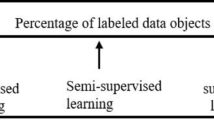Abstract
Federated learning is a hot topic on privacy preserving data analysis and has also been applied to fuzzy c-means clustering. In this paper, a federated learning scheme is proposed for linear fuzzy clustering with horizontally distributed data, where each cluster is represented by a linear-shape prototype. In order to merge the client-wise independent clustering results without violating personal privacy, gradient information of each prototype instead of original observation are shared at the centralized server. The objective function is defined with the least square criterion, which is useful in handling component-wise errors and makes it possible to find cluster basis vectors without solving an Eigen problem. Therefore, attribute-wise gradient decent learning can be realized by utilizing only gradient information of prototype parameters at the central server. The global prototypes are securely updated then distributed to clients for next updating. Experimental results demonstrate that the proposed algorithm is useful for reconstructing the whole data result under privacy preservation.
This work was supported in part by JSPS KAKENHI Grant Number JP18K11474 and JP22K12198.
Access this chapter
Tax calculation will be finalised at checkout
Purchases are for personal use only
Similar content being viewed by others
References
Aggarwal, C.C., Yu, P.S.: Privacy-Preserving Data Mining: Models and Algorithms. Springer-Verlag, New York (2008)
Chen, T.-C.T., Honda, K.: Fuzzy Collaborative Forecasting and Clustering. SAST, Springer, Cham (2020). https://doi.org/10.1007/978-3-030-22574-2
McMahan, B., Ramage, D.: Federated learning: collaborative machine learning without centralized training data, Google AI Blog, April 06 (2017)
Yang, Q., Liu, Y., Cheng, Y., Kang, Y., Chen, T., Yu, H.: Federated Learning. Morgan & Claypool Pub, New York (2019)
Yang, Q., Fan, L., Yu, H.: Federated Learning. Privacy and Incentive. Springer, Berlin, Germany (2020). https://doi.org/10.1007/978-3-030-63076-8
Bezdek, J.C.: Pattern Recognition with Fuzzy Objective Function Algorithms. Plenum Press, New York (1981)
Miyamoto, S., Ichihashi, H., Honda, K.: Algorithms for Fuzzy Clustering. Springer, Heidelberg (2008). https://doi.org/10.1007/978-3-540-78737-2
Pedrycz, W.: Federated FCM: clustering under privacy requirements. IEEE Trans. Fuzzy Syst. 30(8), 3384–3388 (2022)
Bezdek, J.C., Coray, C., Gunderson, R., Watson, J.: Detection and characterization of cluster substructure 1. Linear structure: Fuzzy \(c\)-lines. SIAM J. Appl. Math. 40, 339–357 (1981)
Honda, K., Ichihashi, H.: Linear fuzzy clustering techniques with missing values and their application to local principal component analysis. IEEE Trans. Fuzzy Syst. 12(2), 183–193 (2004)
Honda, K., Ichihashi, H.: Component-wise robust linear fuzzy clustering for collaborative filtering. Int. J. Approx. Reason. 37(2), 127–144 (2004)
MacQueen, J. B.: Some methods of classification and analysis of multivariate observations. In: Proceedings of 5th Berkeley Symposium on Mathematical Statistics and Probability, pp. 281–297 (1967)
Wu, J.B.: Advances in \(K\)-means Clustering. A Data Mining Thinking. Springer, Berlin, Heidelberg (2012). https://doi.org/10.1007/978-3-642-29807-3
Wang, W., Zhanga, Y.: On fuzzy cluster validity indices. Fuzzy Sets Syst. 158, 2095–2117 (2007)
Bezdek, J.C., Coray, C., Gunderson, R., Watson, J.: Detection and characterization of cluster substructure 2. Fuzzy \(c\)-varieties and convex combinations thereof. SIAM J. Appl. Math. 40, 358–372 (1981)
Honda, K., Kunisawa, K., Ubukata, S., Notsu, A.: Fuzzy c-varieties clustering for vertically distributed datasets. Proc. Comput. Sci. 192, 457–466 (2021)
Author information
Authors and Affiliations
Corresponding author
Editor information
Editors and Affiliations
Rights and permissions
Copyright information
© 2023 The Author(s), under exclusive license to Springer Nature Switzerland AG
About this paper
Cite this paper
Honda, K., Amejima, R. (2023). A Federated Learning Model for Linear Fuzzy Clustering with Least Square Criterion. In: Honda, K., Le, B., Huynh, VN., Inuiguchi, M., Kohda, Y. (eds) Integrated Uncertainty in Knowledge Modelling and Decision Making. IUKM 2023. Lecture Notes in Computer Science(), vol 14376. Springer, Cham. https://doi.org/10.1007/978-3-031-46781-3_2
Download citation
DOI: https://doi.org/10.1007/978-3-031-46781-3_2
Published:
Publisher Name: Springer, Cham
Print ISBN: 978-3-031-46780-6
Online ISBN: 978-3-031-46781-3
eBook Packages: Computer ScienceComputer Science (R0)




